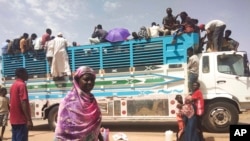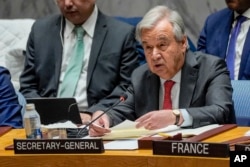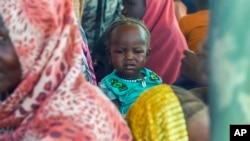The United Nations Security Council adopted a resolution Friday calling for a Ramadan cease-fire in Sudan, where the U.N. secretary-general warned this week that the humanitarian crisis has reached "colossal proportions."
"With the adoption of this resolution, the council has sent a strong and clear message to Sudanese Armed Forces and Rapid Support Forces to agree an immediate cessation of hostilities during the month of Ramadan," said British Deputy Ambassador James Kariuki, whose delegation drafted the text.
The Muslim holy month starts early next week and lasts about 30 days.
"This follows the call of the secretary-general and the African Union," Kariuki said. "We urge the Sudanese Armed Forces and the Rapid Support Forces to act on this united international call for peace and to silence the guns."
The U.S. envoy Robert Wood condemned atrocities committed by both sides in the nearly year-old war.
"This tragedy has gone on too long," he said. "We must unite to prevent and stop the flow of weapons that is fueling this conflict."
The resolution, adopted by a vote of 14 council members in favor, none against and Russia abstaining, calls for "an immediate cessation of hostilities during the month of Ramadan, and for all parties to the conflict to seek a sustainable resolution to the conflict through dialogue." It also calls on them to remove any obstructions to the distribution of humanitarian aid.
It was not immediately clear whether the parties to the conflict would heed the cease-fire call.
A day earlier, U.N. Secretary-General Antonio Guterres appealed for a Ramadan cease-fire, saying it is time for rival generals there to lay down their weapons.
"This cessation of hostilities must lead to a definitive silencing of the guns across the country and set out a firm path towards lasting peace for the Sudanese people," Guterres said.
Fighting erupted in April of last year between the forces of Sudan's army chief, General Abdel-Fattah Burhan, and Mohammed Hamdan Dagalo, who commands the paramilitary Rapid Support Forces. The two generals were once allies in Sudan's transitional government after a 2021 coup but became rivals for power.
The ensuing power struggle has led to thousands of deaths, a massive displacement crisis and large-scale atrocities, particularly against non-Arab communities in the country's Darfur region. Hunger is also reaching catastrophic levels, and the U.N. has received reports of children dying from malnutrition.
Humanitarian catastrophe
Humanitarian chief Martin Griffiths told reporters Friday that a pause in fighting would be welcome.
"If that goes through and if it is observed by both sides, I can assure you we will be piling in the aid — pre-positioning [aid], repairing institutions, getting children out to safety, and so forth."
The humanitarian operation is woefully underfunded. The U.N. has appealed for $2.7 billion for Sudan this year, and Griffiths said it is only 4% funded.
The U.N. says about 25 million people — half of Sudan's population — need some form of humanitarian assistance. Of them, 18 million face acute food insecurity — 10 million more than a year ago.
"Ten million Sudanese have become food insecure because of this conflict that should never have started," Griffiths said.
Sudan is now home to the world's largest internal displacement crisis, with 6.3 million people forced from their homes in search of safety. Another 1.7 million have fled to neighboring countries. More than 70% of health facilities in areas where there is fighting have stopped functioning.






